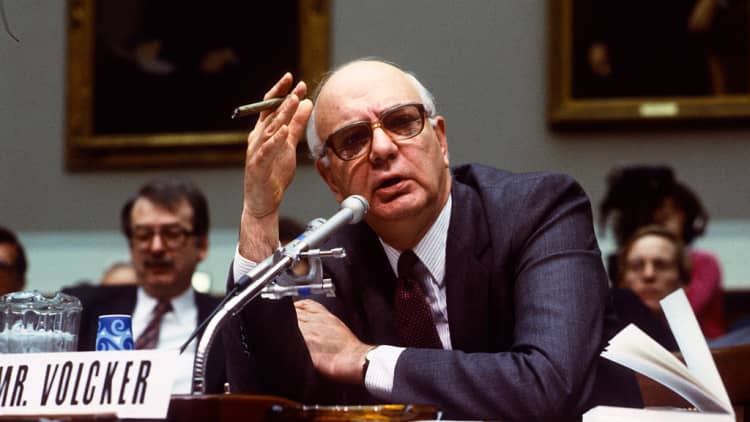Paul Volcker's greatest legacy as Fed chief was breaking inflation with shockingly high interest rates, but he turned the housing market into a nightmare for both buyers and sellers.
Volcker allowed the fed funds rate, now topped out at 1.75%, to rise over 20%, and with it went the interest on home mortgages and everything else. The 30-year mortgage rate spiked into the high teens in late 1981 and continued at double digits until 1990.
"People thought they'd never buy a home again, and they did," said Diane Swonk, chief economist at Grant Thornton. "What was amazing was the back-to-back recessions of 1981 and 1982, which he used to break the back of inflation. ... He tightened policy, and brought the economy to its knees. He flipped the switch again, and the economy powered forward in a way it hasn't since."

Volcker passed away at his home Sunday, at the age of 92. He was named Fed chairman in 1979 by President Jimmy Carter. He was reappointed by President Ronald Reagan in 1983 and served until 1987.
"He was the dragon slayer when it came to reining in inflation. At the beginning of the '80s, people thought inflation would keep rising at 10% a year," said Chris Rupkey, chief financial economist at MUFG Union Bank.
Rupkey said that when rates were streaking higher, many home buyers couldn't get credit from banks. "They didn't think the home buyer could afford the interest rate, so they would limit the mortgage home buyers could get," he said. "So what happened, especially in some of the higher priced markets, is the home seller would own the loan to get the home sold."
Ward McCarthy, chief financial economist at Jefferies, was one of those buyers. He remembers the challenge of trying to find a first home, as Volcker used controversial interest rate policies to stop inflation.
"The only way I bought my first house in Richmond, Virginia, was because there was an assumable mortgage with the house. Part of my mortgage was 8%. Part was 14%, and because of the blended rate it was substantially lower than that," he said.
But the tactic worked. "His policy was so effective that the CPI [Consumer Price Index] went from 14.85% in March 1980 to 2.5% by July 1983," McCarthy said.
"What Volcker did was raise the fed funds rate to levels people never thought they would see. In 1981, the fed funds rate was consistently 20% or higher for roughly half the year, and at least on one day it was 22%," McCarthy said. "He caused two recessions to get what he wanted. It took massive courage to do that."
Volcker was not without his critics in Washington and in the business world.
"It was controversial. There were farmers and business executives out in front of the Fed picketing and complaining about interest rates," Rupkey said. "Nobody wanted to see interest rates going higher. The way he got around it was the money supply target. They could say, 'It was out of our hands ... it was the fuel for additional inflation.'"
"So when money supply grew faster than target, they drained reserves in the system and that effectively pushed up the fed funds rate to extremely high levels," he said.
Rupkey said Volcker's legacy is still apparent after making a mark on the economy and Fed policy.
"A tall tree has fallen in the forest," he said. "It's ironic that he cured the inflation problem and [Fed Chairman Jerome] Powell thinks he has a new problem. The struggle the Fed has now is with too-low inflation."
Former Fed Chairman Alan Greenspan on Monday called Volcker "the most effective chairman in the history of the Federal Reserve."


